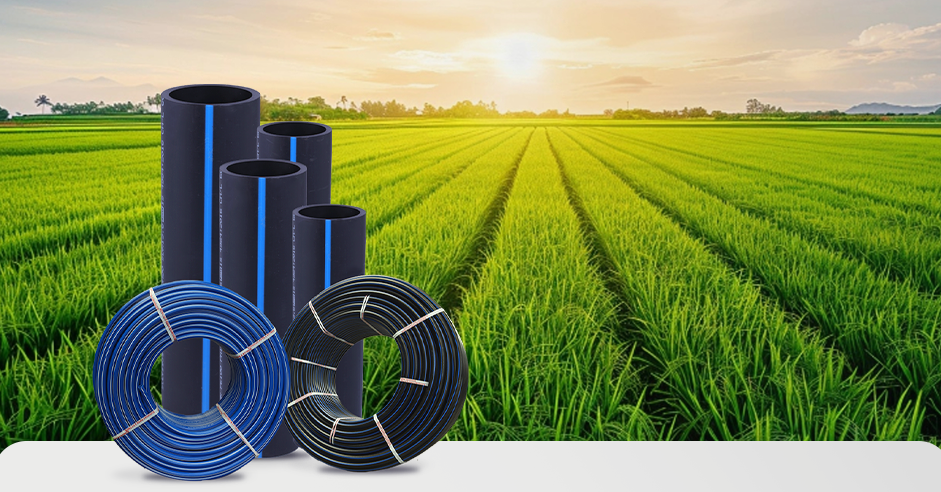Why Builders Prefer hdpe pipe in stock Midland TX for Immediate Projects
Wiki Article
Recognizing the Secret Benefits of HDPE Pipe for Water and Wastewater Management
Using HDPE pipe in water and wastewater management provides various advantages that merit consideration. Its extraordinary resilience and lengthy life-span make it a recommended option for several tasks. Furthermore, the material's resistance to deterioration and chemical damage boosts its dependability in various atmospheres. Nevertheless, the benefits prolong beyond simply long life and resistance. Discovering its cost-effectiveness and ecological impact discloses much more engaging factors for its widespread fostering in modern-day facilitiesRemarkable Toughness and Durability

HDPE pipe stands out for its outstanding resilience and durability, making it a recommended option in water administration systems. Created from high-density polyethylene, these pipelines can stand up to considerable pressure and tension, guaranteeing trustworthy efficiency gradually. Their durable nature permits them to withstand severe environmental conditions, including temperature level variations and soil motions, which can trigger various other products to stop working.
The life-span of HDPE pipelines frequently surpasses half a century, providing a cost-efficient option for districts and markets alike. Additionally, the material's light-weight homes streamline installment, decreasing labor prices and timeframes. This sturdiness lessens the demand for frequent repairs or substitutes, additionally improving its financial appeal.
In water administration applications, the reliability of HDPE pipelines suggests less disturbances and enhanced service continuity, making them important to sustainable infrastructure development. The combination of longevity and longevity strengthens HDPE's role as a keystone in efficient water management solutions.

Resistance to Rust and Chemical Damage
While lots of products surrender to deterioration and chemical damage in time, HDPE pipelines display impressive resistance, making them optimal for various water monitoring applications. This strength stems from the molecular structure of high-density polyethylene, which is inherently non-reactive and does not rust like metals or degrade from exposure to extreme chemicals. As a result, HDPE is highly effective in environments with hostile materials, such as wastewater systems that might have acids, bases, and natural solvents.
Additionally, HDPE pipes can endure ecological aspects such as dirt level of acidity and saline problems, additionally boosting their viability for varied applications (hdpe pipe fittings Midland TX). Their capacity to maintain structural stability with time minimizes the risk of leakages and failings, which is critical in making certain the safety and security and reliability of water circulation and wastewater monitoring systems. As a result, the resistance to deterioration and chemical damage markedly adds to the general effectiveness and durability of HDPE piping solutions
Cost-Effectiveness and Financial Benefits
When considering the economic effects of water monitoring systems, the cost-effectiveness of HDPE pipelines becomes noticeable. These pipes offer reduced setup and maintenance expenses contrasted to standard materials like metal or concrete. Their lightweight nature simplifies transport and setup, causing minimized labor costs. Additionally, HDPE pipelines exhibit a lengthy life-span, often going beyond 50 years, which equates to less replacements and lasting cost savings.Moreover, the resistance of HDPE to deterioration and chemical damages reduces the demand for pricey repair work and replacements. The pipelines additionally support reliable water flow, minimizing power expenses linked with pumping systems. By mitigating leaks and water loss, HDPE pipes add to substantial financial benefits for towns and sectors alike. Generally, the first investment in HDPE piping can yield considerable monetary returns over the life expectancy of the water management system, making it a prudent selection for lasting framework growth.
Environmental Sustainability and Reduced Effect

Versatility and Flexibility in Installment
As a result of their unique buildings, HDPE pipes supply exceptional flexibility and adaptability in setup, making them appropriate for a variety of applications. Their lightweight nature allows for easier handling and transport, decreasing labor prices and installation time. HDPE pipes can be bent and shaped to fit various terrains and job needs, which is specifically useful in challenging atmospheres.In addition, their resistance to deterioration and chemical damage permits setup in varied setups without the demand for specialized safety layers. The capacity to fuse joints creates a continuous, leak-free system, boosting the overall integrity and dependability of the installment. HDPE's flexibility likewise fits ground movement, reducing the risk of damages in areas vulnerable to shifting soil. On the whole, these features make HDPE pipes not only flexible but additionally a recommended option for water and wastewater administration systems.
Regularly Asked Concerns
How Does HDPE Pipeline Compare to PVC in Water Administration Applications?
HDPE pipe offers superior flexibility, resistance to rust, and longevity contrasted to PVC. Its lighter weight assists in less complicated installment, while its lengthy lifespan reduces replacement expenses, making HDPE a recommended choice in water monitoring applications.What Is the Life-span of HDPE Pipes Under Normal Conditions?
Under regular problems, HDPE pipes can have a life-span varying from 50 to 100 years. Their toughness and resistance to corrosion add to their lasting efficiency in click here various applications, making them a reliable option for facilities.Are HDPE Piping Recyclable After Their Life Span?
Yes, HDPE pipelines are recyclable after their service life. American Plastics HDPE Pipe Manufacturing. They can be processed and repurposed right into new products, significantly lowering environmental effect and advertising sustainability within the industry, making them an eco-friendly choice for piping solutionsWhat Is the Installation Process for HDPE Pipes?
The installation procedure for HDPE pipes includes site preparation, trenching, pipeline combination or mechanical joining, backfilling, and pressure testing. Correct methods assure a long lasting and effective system for carrying water and wastewater effectively.Can HDPE Pipes Be Utilized for Both Potable and Non-Potable Water Systems?
Yes, HDPE pipelines can be utilized for both drinkable and non-potable water systems. Their versatility, toughness, and resistance to corrosion make them ideal for various applications, guaranteeing safe and reliable transport of water in different contexts.Report this wiki page